From Mississippi to Chicago to Belarus, ancestors guide her way
Connecting with our past can bring "life-changing potential," says assistant professor Tina Sacks
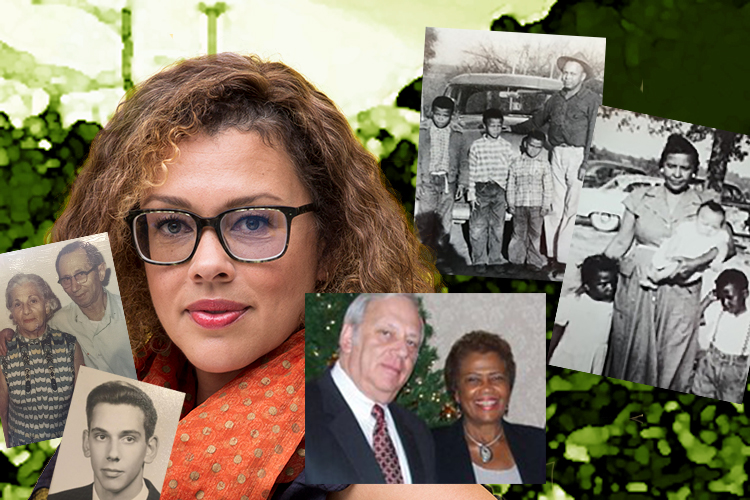
October 3, 2019

“My ancestors give me a sense of profound empathy and also a sense that humans have dealt with racism, xenophobia, for so long. … It makes me both deeply sad and activated to try and do whatever I can to interrupt that,” says Tina Sacks, assistant professor of social welfare. (Photo by Carlos Javier Ortiz)
During the 400th anniversary of the arrival of enslaved Africans to the English colonies, we’re highlighting members of the campus community whose personal stories, often marked by racism and discrimination, inform their life’s work. We begin with Tina Sacks, UC Berkeley assistant professor of social welfare, who tells of the struggles, self-determination and achievements of her African American and Jewish ancestors.
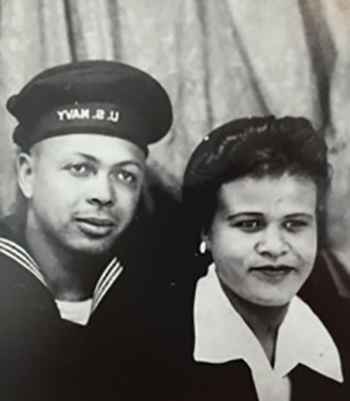
J.B. and Lucille Parks, Tina Sacks’ maternal grandparents. Her grandfather, a sharecropper in Mississippi, later served in the U.S. Navy. He and his family — including Sacks’ mother, starting at age 6 — picked cotton. (Photo courtesy of Tina Sacks)
“Like many young people, when I was growing up I didn’t think much about my mother’s origins. I knew she was from Mississippi, and she had a strong Southern accent, but it washed over me. Most of the black people I knew in Chicago sounded like her, because the vast majority of them were Southerners who were part of the Great Migration.
My mom, Bette Parks Sacks, was born in 1939 and came of age at a difficult time. She was the middle child of 10 kids; one was stillborn, and her brother died when he was only 7 years old. When she was 13, her mother, Lucille, died. My grandfather, J.B. Parks, and his family were sharecroppers in the town of Walnut, about an hour south of the Mississippi/Tennessee border. My mom talked all the time about their deep, deep poverty, the hunger, the cold. She talked all the time about being hungry and cold. She didn’t have shoes — she may have had one pair of shoes a year, but often walked barefoot. By the time she was 6, she was picking cotton and could drag 100 pounds of it behind her. She described having a long burlap bag that she put cotton in. It hooked around her arm and trailed behind her. Sometimes, in the fields, it was so hot that she said she’d literally vomit, and then just keep going.

Read more stories about UC Berkeley’s observance of the 400th anniversary of the arrival of enslaved Africans to the English colonies.
My mom’s sibling, Robert Baby, got hit by a car when they were crossing a two-lane highway on their way to school and died immediately. The driver, a white guy, was going about 65 in a 15-mile-per-hour zone and was never charged. He stopped after the accident, but according to my mom, he lamented at the scene that he wouldn’t even hit a dog, which she took to mean that he thought of a little black kid as something akin to an animal. My mom and her brother were holding hands when it happened. He was seven, and she was nine. The trauma, the deprivation she experienced, I could just keep going on forever.
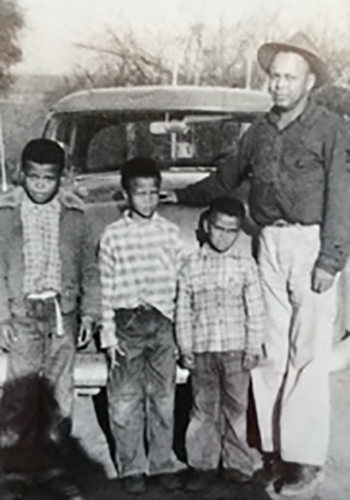
Sack’s grandfather with sons (left to right) Junior, Billy and Terry. (Photo courtesy of Tina Sacks)
Being sharecroppers meant my grandfather and the rest of the family worked land that was owned by a white man, Mr. Hugh, and he kept the books. And he would cook the books to say they owed him for seed, for whatever materials they used to bring the crop in. You could never get ahead. That system was the extension of slavery. As I think about the 400th commemoration of slavery, my mom’s childhood makes me think about how the roots that were put down by slavery evolved, but at the core they were, and still are, present like deep roots in the soil. You could never get free of them. A story that perfectly illustrates this is that, one time, when they brought their crops in at the end of the season, the white man’s wife, Ms. Robby, who was doing the tally, said that my grandfather had gotten some ice cubes from Mr. Hugh’s house one day — my mom’s family didn’t have electricity or a refrigerator — and she deducted something like 5 cents for the ice cubes. My grandfather wasn’t a shrinking violet, but if you said anything back, the consequences were violence. It was a whole system of psychological violence. Also, the predation of black girls by white men was profound.
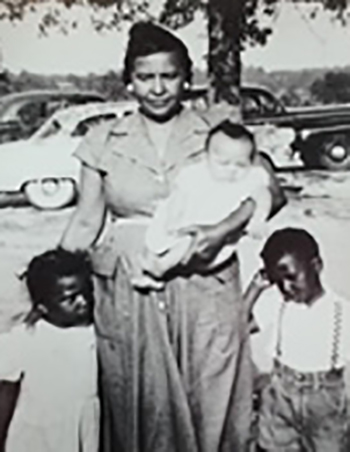
Tina Sacks’ great-grandmother, Gertrude, standing next to Sacks’ Aunt Wanda and Uncle Terry. They lived in the Ball Hill neighborhood of Walnut, a small town in Mississippi. Sacks says the baby is likely the child of another relative. (Photo courtesy of Tina Sacks)
My mom came to Chicago by train when she was 17. She was one of many, many, many black people — 6 million — who left the South for the North between 1910 and 1970. She came with her father and three brothers, and they left everything behind. My mom also had a sister who was only 18 months old when their mother died, and she remained in Mississippi with their grandmother until my mom and the rest of the family got settled. My mom had been caring for her brothers since she was 13. In Chicago, she had to get them enrolled in school, and then she worked at a dry cleaner and eventually as a court reporter. My Aunt Mae had already gone to Chicago and bought a house on 35th and Indiana. A greystone. She turned it into a rooming house, and she had a whole hustle renting rooms to newly arrived migrants from the South. She was able pay off the entire mortgage in four years That’s where my mother and grandfather lived. My Uncle Terry still lives there.
I’m really interested in the profound vulnerabilities people have, and the ways that racism and discrimination have affected me, at a cellular level, because of my ancestors on both sides, all of the migrants, trying to thrive for generations. People don’t think of black people as immigrants, but the Great Migration was the largest internal migration in U.S. history. My mom was a displaced person, and my grandparents as well.

Stanley Joel Sacks, Tina Sacks’ father, in his early 20s. He met her mother, Bette, in Chicago, where today she is a retired court reporter and he is a judge
in the main criminal court building in Cook County. (Photo courtesy of Tina Sacks)
The story of my dad, Stanley, is also one of movement. His people were Jewish and came from a different part of the world. They’re less known to me, because my father doesn’t know much about them. But I was very close to my dad’s mother, Dora. She did not read or write in English. Yiddish was her first language. Once I learned to drive, I would take her to the grocery store, and she had her list written in Yiddish. I heard bits and pieces about her life in the Old Country, now probably Belarus, in a shtetl outside of Minsk. As a teenager, she survived many pogroms before World War II that essentially were ethnic cleansing, and she once hid in a barn under hay for a week while soldiers looted and burned. She was 19 when she came to the U.S. on a ship with my paternal grandfather. They had met in Belarus, but got married here. Many of my grandmother’s relatives died in the camps during World War II. She never saw her parents again. But she would never talk about it. Only once she spoke about one of her cousins, whose infant was shot by an SS guard in front of her, and she is said to have died of a heart attack, right there.
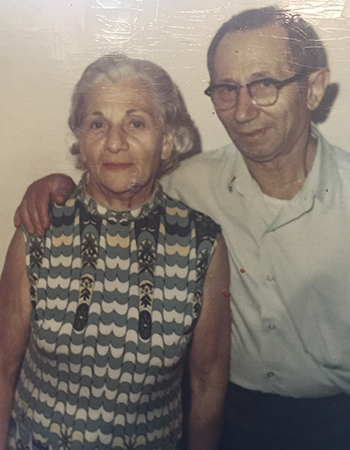
David and Dora Stacks, Tina Sacks’ paternal grandparents, circa the 1970s. They met in Belarus and traveled together as teens to America, where they married and eventually settled in Chicago. (Photo courtesy of Tina Sacks)
My paternal grandparents first made a life for themselves in New York. They had a pushcart and sold food on the street. But New York was too expensive, so they moved to Chicago because it was more affordable, and they had some family there. My dad and his two sisters were born there. They faced a lot of anti-Semitism and started off relatively poor, but ended up middle class. They paid for my dad’s education, and he eventually went to law school, met and married my mom in Chicago and is now a judge.
A big part of my evolution, my progress toward drawing a connection between my ancestry on both sides, was my older brother Drake, who was born during my mother’s first marriage. He helped me see the similarities, as well as the differences, between the discrimination and the xenophobia — prejudice against people from other countries — that my mom and dad faced.
My ancestors give me a sense of profound empathy and also a sense that humans have dealt with racism, xenophobia, for so long. Like right now, the fact that children are separated from their parents at the Southern border and put in cages is the actual foundation of this country. It is not anomalous, as some people suggest. It makes me both deeply sad and activated to try and do whatever I can to interrupt that. Certainly, in my classes, I teach from a critical perspective. In my class on the American welfare state, I talk about how anti-immigrant sentiment is woven into how we think about providing a safety net for other people. We extract a lot of work from immigrants, but our programs for them are by no means benevolent. We need to understand the origins of how our programs for the poor are structured.

Tina Sacks and her parents, Stanley and Bette, about 10 years ago. (Photo courtesy of Tina Sacks)
In my office hours, when I’m in one-on-one settings, I become so completely inspired by my students. I learn probably more from them than I’m capable of teaching them. Some of them also tell me they feel they can’t cut it here — whether for financial reasons, as they are often working and supporting family, or because they just don’t know the unwritten rules of the academy: What does it meant to go to office hours? How do you get a letter of recommendation? Many of them live in really dire circumstances. I let them know they’re not alone; I’m very open about the challenges I face here, that even I feel like an imposter sometimes.
Once during office hours, a student had a photo and said, “I want to show you this.” It was his immigrant mother’s expired photo I.D. card for a food bank, and he said, “I’ve been ashamed of this my whole life until I took your class. My mother was cleaning everybody’s houses so that we wouldn’t have to work, and we felt ashamed. But for the first time in my life, I realize that feeling was part of the social structure designed this way to make us feel shame and otherness.”
That was a profound moment for me, because I realized the life-changing potential of both education and human connection. That student eventually excelled at Cal after many early challenges here. I think being able to throw off some of that shame allowed him to flourish. If we can demystify that system, it can give us the freedom to shine.”
— As told to Gretchen Kell, director of special projects and outreach, UC Berkeley Office of Communications and Public Affairs